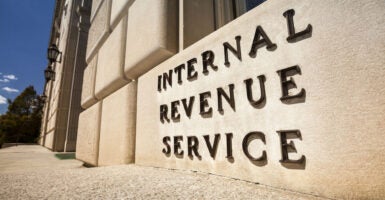President Joe Biden and congressional Democrats are trying to force financial institutions to report their customers’ account balances to the Internal Revenue Service, thereby invading your privacy and putting more of your financial data at risk.
It’s part of a provision in the $3.5 trillion spending bill that should raise the ire of all Americans.
Under this requirement, the Internal Revenue Service—an already scandal-ridden and historically politicized government agency—could once again be weaponized against political opponents while leaving middle-class Americans vulnerable to having more of their financial information hacked or leaked.
This is because the Biden administration’s proposal would require financial institutions to report all transactions from accounts holding more than $600. It is couched as an effort to catch tax evaders and pay for the $3.5 trillion spending package.
After sparking outrage among both consumer and financial institutions, House Democrats were sent back to the drawing board. Instead of realizing that the policy itself massively violates Americans’ privacy, House Ways and Means Chairman Richard Neal, D-Mass., still considers it a financial issue and said that Democrats may raise the threshold from $600 to $10,000.
The Internal Revenue Service as a Political Weapon
Regardless of what the Democrats ultimately agree to, this provision raises concerns over the return of an egregiously politicized Internal Revenue Service. The federal government’s tax-collecting agency has had a history of attacking groups and individuals who hold particular political beliefs.
In 2013, the Treasury Department’s Inspector General for Tax Administration reported that the Internal Revenue Service under Lois Lerner, an Obama nominee, “targeted specific groups applying for tax-exempt status, delayed processing of targeted groups’ applications for tax-exempt status, and requested unnecessary information from targeted groups.”
The report explicitly mentions the tea party and other conservative groups as the target of this abuse.
Additionally, a pair of 2016 reports released by the Government Accountability Office said the Internal Revenue Service is still selecting individuals and small businesses for unfair audits “based on an organization’s religious, educational, political, or other views.”
With these new provisions, the political attacks would not be limited to groups and instead give the Internal Revenue Service carte blanche to go after individual Americans.
All Americans—not just conservatives—should be concerned by this level of public corruption and the Internal Revenue Service’s ability to go after those it sees as the regime’s enemy.
A History of Hacks and Leaks
This proposal is also a great consumer privacy concern. Americans will entrust even more of their financial information to a government agency that has been the subject of hacks and politically motivated leaks.
From January 2014 to May 2015, online hackers targeted the Internal Revenue Service’s Get Transcript application that enabled taxpayers to view, download, and order transcripts of their previous tax filings. The Internal Revenue Service’s statement on the breach admits to nearly 700,000 U.S. taxpayers’ accounts being compromised.
Just this year, an anonymous leaker handed over a “vast cache of [Internal Revenue Service] information” to investigative the journalism website ProPublica. The documents covered more than 15 years of tax returns of thousands of America’s wealthiest individuals.
While the story is centered around the nation’s wealthy, this highlights once again the reality that partisan actors within the Internal Revenue Service can and have acted in bad faith for political ends.
Ineffective in Raising Revenue
A more magnified scrutiny of Americans’ bank accounts will only increase the burden on individuals, small businesses, and community banks that must dedicate finite resources to meet these reporting requirements and do nothing to ensure the wealthy pay “their fair share.”
“It won’t be effective in reducing the tax gap,” said Matthew Dickerson, director of The Heritage Foundation’s Center for the Federal Budget. (The Daily Signal is the news and commentary platform of The Heritage Foundation.)
“The [Internal Revenue Service] would accumulate massive amounts of data on people’s financial records, but much of that information would not actually show the [Internal Revenue Service] what the person’s taxable income is.”
In a Senate Banking, Housing, and Urban Affairs Committee hearing on Sept. 28, Sen. Cynthia Lummis, R-Wyo., questioned Treasury Secretary Janet Yellen on the necessity of this proposal, stating the new regulation would treat the American people as “subjects of the government.”
Yellen provided no clarity on how exactly tracking account inflows and outflows will close the tax gap other than stating that the reporting requirement will add more lines to an already complicated tax filing process.
While this provision was not initially included in the House Ways and Means Committee markup, House Democrats plan to push the proposal during this week’s Rules Committee markups.
Biden’s catch-and-tax scheme will not generate the administration’s projected revenue target. Americans should be aware of the potential abuse this provision lends itself to, including a divisive administration and a risk to consumer privacy and financial data. The payoff in funding this behemoth of a spending bill is low.
The requirement for banks to report on the accounts of their customers to the Internal Revenue Service is just another way for the federal government to embolden its regulatory regime, and simply opens more ways for a historically weaponized Internal Revenue Service to go after American citizens.
Joel Griffith, Heritage’s research fellow in financial regulations, said, “Smaller financial institutions will face onerous compliance costs. Ultimately, everyday families and businesses experience a loss of personal privacy, higher checking account fees, lower yields on savings, and fewer free services as a result.”
The Internal Revenue Service along with the rest of the administrative state already have a strong grip on our day-to-day activities. They do not need another channel to intrude on Americans’ personal lives.
Have an opinion about this article? To sound off, please email [email protected] and we’ll consider publishing your edited remarks in our regular “We Hear You” feature. Remember to include the URL or headline of the article plus your name and town and/or state.































